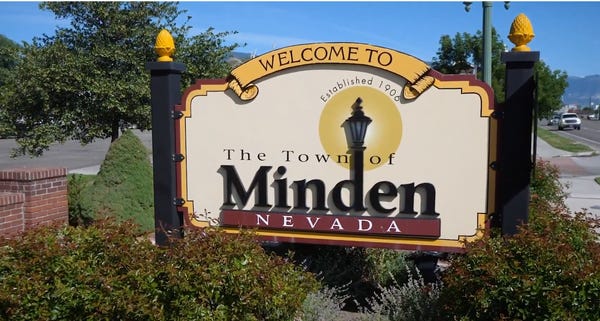Nevada 'Sundown Town' Air Siren Isn't A Dog Whistle, It's An ... Oh, We Just Said. It's An Air Siren.
The siren is just honoring first responders! Yeah, that’s the ticket.
Minden, Nevada, was once a sundown town. “Colored people" weren't welcome after dark. The discriminatory practice dates back to before the American revolution, to 1714, when the New Hampshire assembly passed "An Act To Prevent Disorders In The Night":
Whereas great disorders, insolencies and burglaries are oft times raised and committed in the night time by Indian, Negro, and Molatto Servants and Slaves to the Disquiet and hurt of her Majesty's subjects, No Indian, Negro, or Molatto is to be from Home after 9 o'clock.
In Minden and the adjacent town, Gardnerville, Native Americans were required to be in their homes or out of town by 6: 30 p.m. This ordinance was in effect from 1917 to 1974. The Paiute, Shoshone, and Washoe tribes inhabited what is now Nevada before white folks showed up and “liberated" them from their land. A whistle, and later a red siren, would sound at 6 p.m., giving Native Americans a half hour to scatter before the police showed up to protect and serve the hell out of them.
The red siren still goes off today. The piercing sound is heard through the ranches and towns of northern Nevada's Carson Valley, including Dresslerville, which is home to the Washoe Tribe of Nevada and California. It doesn't recall fond memories.
To Serrell Smokey, the tribe's chairman, the sound is a reminder of racism and violence inflicted upon Native Americans — a "living piece of historical trauma" with an enduring legacy. He requested officials in the town of Minden silence the region's last remaining siren last summer.
That's a reasonable request, which Minden officials mostly ignored. White residents insist the siren is just a “charming dinner bell," which it probably was for white people. Native Americans had to take their meals to go. According to Smokey, tribal Elders remember seeing law enforcement jailing Native Americans and residents attacking people of color. The past is never that far past.
Hoping to improve relations with the Washoe, Minden County officials generously turned off the racist alarm in 2006, but that lasted just two months because the white locals protested bitterly about the loss of their dinner bell. How else would they know when it was supper time? The siren started up again, but reportedly “as consolation," Minden passed an ordinance that claimed the siren was actually honoring first responders. With this logic, the town could've burned crosses on people's lawns and just passed BS ordinances describing them as friendly bonfires.
Last June, Nevada banned sirens, alarms, and bells and other noise-making devices historically associated with sundown ordinances. This was part of a new law that directed schools boards to stop already with the racist mascots. Minden fought the passage of the law, which some residents described as “cancel culture" — presumably because they watch too much Fox News. They argue that the siren is somehow central to their heritage. Why, it's not a lingering racial scar but a "traditional, small-town hallmark that makes the historic ranching community unique."
Small town Americana might seem pleasant, especially in those "Twilight Zone" episodes where the frazzled New York executive craves a simpler life, but the reality is most of these towns excluded people of color through intimidation and violence. This form of segregation wasn't restricted to Southern states. White Americans across the country believed that increased minority populations threatened their way of life. Donald Trump sounded a similar siren last year when he warned about Cory Booker's invasion of the suburbs.
But too many Americans want to keep these racial scars open and bleeding. They feel mistreated if asked to surrender any artifact from their pasts, no matter whom it hurts. Minden refused to honor the law banning the siren. Instead, they pointed to a loophole: The siren was purchased in 1921, four years after the sundown law was passed so Native Americans can't possibly associate the siren with how it was used for more than 50 years.
Smokey and Minden Town Manager JD Frisby negotiated a compromise last year that, upon reflection, sucks: The siren would go off at 5 p.m. instead of 6. That's just earlier. Smokey should've at least pushed for 7 or 8 p.m. Force these assholes to have dinner like New Yorkers.
Frisby thinks it's just awful that people have misinterpreted the racist siren as racist.
"A lot of Minden residents have taken this hard because their fathers and grandfathers were the ones that worked to save up the money to purchase that siren for the purpose of responding to emergencies," he said. "It's just unfortunate that because of the proximity in time, it's been lumped in with this ordinance."
Isn't it funny how there was an emergency that needed responding to every night at 6 on the dot for 100 years now (minus two months once)? Frisby claims he's found nothing in the town archive or other records that connects the siren to the sundown ordinance, but it's not clear how hard he looked. Regardless, willful ignorance about the past remains a key part of America's legacy.
[ ABC News ]
F ollow Stephen Robinson on Twitter.
Keep Wonkette going forever, please, if you are able!



Our town has a noon siren as well. Don't know what the justification is.
My old man worked on the SAGE project when I was a kid.